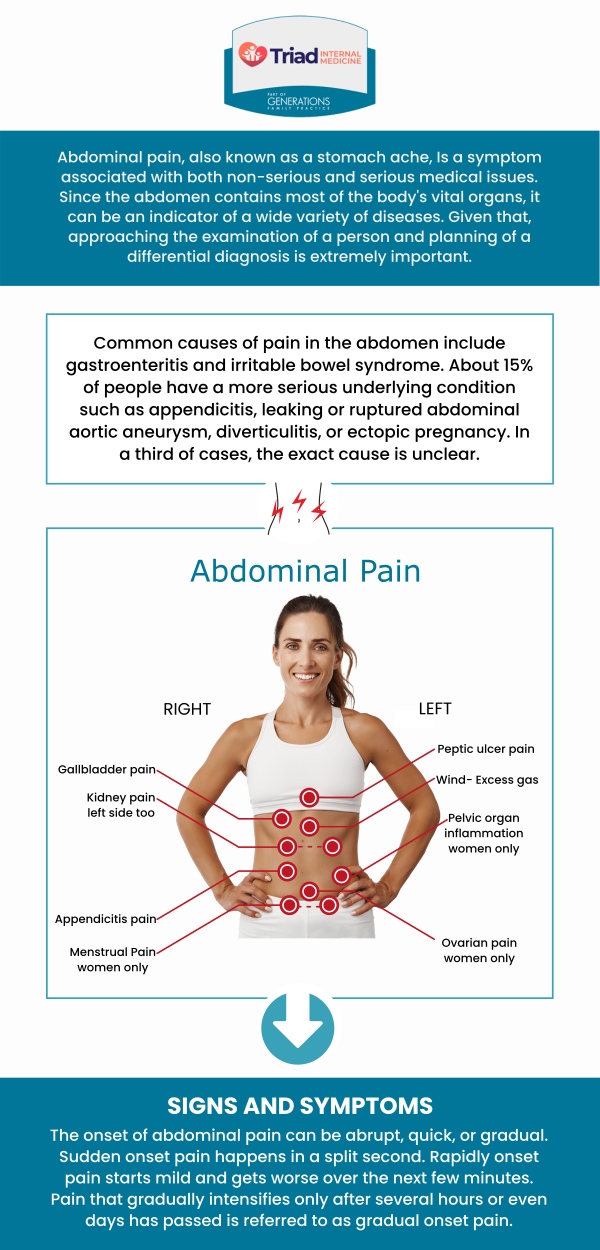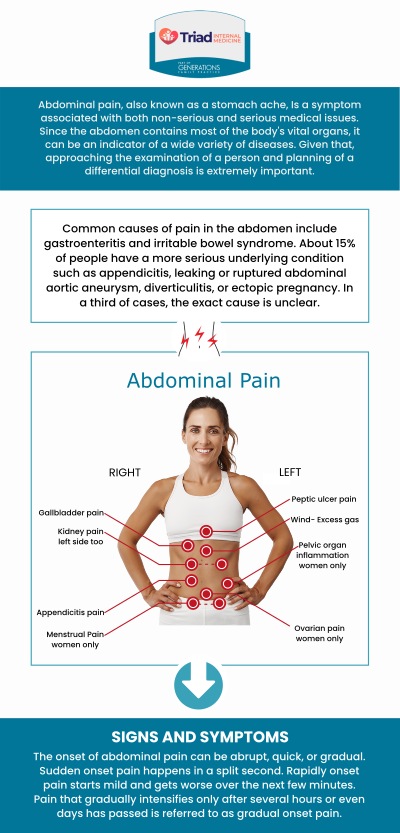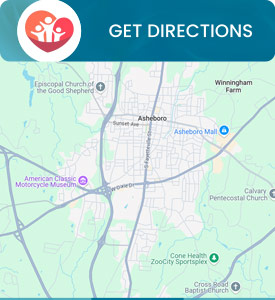Stabbing Pain in the Lower Abdomen: When to Seek Treatment
Stabbing pain in the lower abdomen can be a sign of several different conditions, some of which may require immediate medical attention. At Triad Internal Medicine, we help patients determine the cause of this pain, whether it’s due to gastrointestinal issues, urinary tract infections, or other underlying concerns. If you experience persistent or severe abdominal pain, especially with symptoms like fever, vomiting, or changes in bowel movements, it’s important to seek treatment as soon as possible. For more information, please contact us or book an appointment online. We are conveniently located at Dublin Square and Mack Road in Asheboro, NC.


Table of Contents:
What could be causing stabbing pain in the lower abdomen?
When should I be concerned about stabbing pain in my lower abdomen?
How do I know if my lower abdomen pain requires immediate medical attention?
What are the warning signs that stabbing abdominal pain is serious?
At Triad Internal Medicine, we understand that stabbing pain in the lower abdomen can be alarming and disruptive to your daily life. This type of pain can have many causes, some minor and others more serious, so it’s important to identify the underlying issue as quickly as possible.
Common causes we see in our practice include gastrointestinal problems such as constipation, gas, or irritable bowel syndrome (IBS), which often present as sharp or cramping pains. Infections like urinary tract infections (UTIs) or gastroenteritis also frequently trigger sudden, severe discomfort in the lower abdomen.
For women, gynecological conditions such as ovarian cysts, endometriosis, or even the normal process of ovulation can be sources of stabbing abdominal pain. Another critical cause to consider is appendicitis, especially if the pain is focused in the lower right side and is accompanied by symptoms like fever, nausea, or loss of appetite.
Other potential causes include hernias, kidney stones, or problems with the reproductive organs in both men and women, such as testicular torsion or ectopic pregnancy. At Triad Internal Medicine, our team is experienced in diagnosing and managing these conditions to ensure you receive the appropriate care.
Because stabbing abdominal pain can result from a range of issues—from minor to life-threatening—we encourage you to contact Triad Internal Medicine for a prompt evaluation if your pain is severe, persistent, or associated with other symptoms such as fever, vomiting, or difficulty urinating. Our providers are here to help you find answers, relief, and peace of mind.
At Triad Internal Medicine, we understand that stabbing pain in the lower abdomen can be alarming. This type of pain can have many causes—some minor, others requiring prompt medical evaluation. Paying close attention to your symptoms and their severity is essential for your health and well-being.
You should contact Triad Internal Medicine or seek immediate medical attention if your pain is severe, sudden, or getting worse, or if it is accompanied by any of the following symptoms:
● Fever
● Vomiting or persistent nausea
● Inability to pass stool or gas
● Blood in your stool or urine
● Vaginal bleeding (if applicable)
● Fainting, sweating, or a racing heartbeat
Additionally, pain that develops after a recent injury, surgery, or trauma to the abdomen should be evaluated as soon as possible.
For women, sudden and severe lower abdominal pain could indicate serious conditions such as ovarian cyst rupture, ectopic pregnancy, or pelvic inflammatory disease—all of which require urgent medical care. In both men and women, severe pain could be a sign of appendicitis, kidney stones, urinary tract infection, or gastrointestinal issues like diverticulitis.
If your pain is mild and short-lived, it could be caused by factors such as gas, constipation, or muscle strain. However, if your pain persists for more than a few hours or keeps coming back, it’s important to reach out to our team at Triad Internal Medicine.
If you’re experiencing lower abdominal pain, it’s important to assess the severity and accompanying symptoms to determine if immediate medical attention is needed. If the pain is sudden, severe, or persists for an extended period, it could signal a more serious underlying condition. Other red flags include the presence of fever, vomiting, blood in your stool or urine, or significant changes in your bowel movements.
If the pain worsens over time or is not relieved by basic home care measures, it’s important to seek prompt medical evaluation. Additionally, if you have a history of abdominal issues or if the pain is associated with pregnancy, it’s advisable to consult a healthcare provider right away to ensure that any potential complications are addressed early. Trusting your instincts and seeking timely medical care can prevent more serious health issues.
At Triad Internal Medicine, we understand that sudden, severe abdominal pain can be alarming. It’s important to recognize when this type of pain may be a sign of a serious medical issue requiring prompt attention from a healthcare professional.
Warning Signs You Shouldn’t Ignore:
If you experience stabbing abdominal pain that is severe, comes on suddenly, or feels different from any pain you’ve had before—especially if it wakes you from sleep or appears rapidly—it’s crucial to seek care. Additional symptoms that signal a need for immediate evaluation include:
● Persistent vomiting
● Blood in your stool or vomit
● Black, tarry stools
● Difficulty breathing or chest pain
● Pain radiating to your back
● Rigid, hard abdomen
● Inability to pass gas or have a bowel movement
● High fever with abdominal pain
● Lightheadedness, fainting, or rapid heartbeat
● A feeling of impending doom
If you’ve recently had an injury, trauma, or surgery and develop abdominal pain, this also warrants urgent medical attention. Patients with chronic conditions such as liver disease, heart disease, or those who are pregnant should be especially cautious and seek prompt evaluation for any severe abdominal pain.
Ignoring these warning signs can delay the diagnosis and treatment of life-threatening conditions such as appendicitis, perforated ulcers, bowel obstruction, pancreatitis, or ectopic pregnancy.
Your Health Is Our Priority
At Triad Internal Medicine, our experienced providers are committed to your well-being. If you or a loved one experiences stabbing abdominal pain or any of the symptoms above, please contact our office immediately or visit the nearest emergency room. Early evaluation can make a critical difference in your health and recovery.
When in doubt, it’s always safer to consult with your team. We’re here to help you get the care you need, when you need it most.
When in Doubt, Reach Out
If you are ever unsure about the cause or severity of your pain, it’s always safest to consult a healthcare professional. Our team is here to provide a thorough assessment—early evaluation can help prevent complications and ensure you receive the appropriate care. For more information, please contact us or book an appointment online. We are conveniently located at Dublin Square and Mack Road in Asheboro, NC. We serve patients from Asheboro NC, Redding Hills NC, Greensboro NC, Randleman NC, Sophia NC, Grays Chapel NC, and surrounding areas.
Check Out Our 5 Star Reviews



Additional Services You May Need
▸ Annual Physical Exam
▸ Internal Medicine
▸ Primary Care
▸ Chronic Diseases
▸ Immunizations
▸ Lab Testing
▸ Acute Illness
▸ STD Testing
▸ Flu Shots
▸ COVID-19 Testing
▸ Women’s Health
▸ Dot Physical
▸ Walk in Clinic
▸ X-ray
▸ Urgent Care
▸ Preventative Medicine
▸ Immigration Physical Exams
▸ Trigger Points
▸ Joint Injections
▸ Telehealth
▸ Medical Weight Loss
▸ Addiction Treatment



